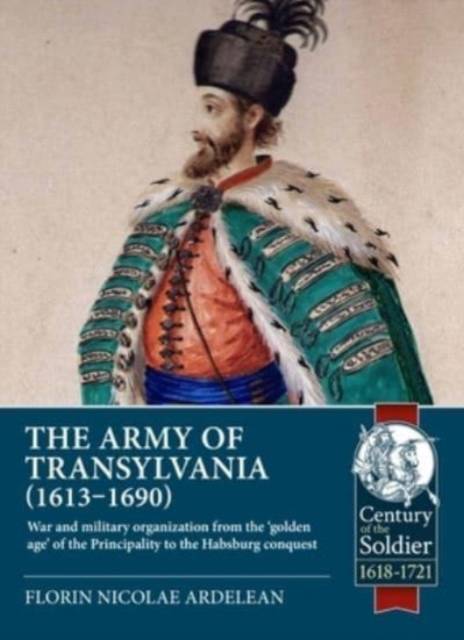
Bedankt voor het vertrouwen het afgelopen jaar! Om jou te bedanken bieden we GRATIS verzending (in België) aan op alles gedurende de hele maand januari.
- Afhalen na 1 uur in een winkel met voorraad
- In januari gratis thuislevering in België
- Ruim aanbod met 7 miljoen producten
Bedankt voor het vertrouwen het afgelopen jaar! Om jou te bedanken bieden we GRATIS verzending (in België) aan op alles gedurende de hele maand januari.
- Afhalen na 1 uur in een winkel met voorraad
- In januari gratis thuislevering in België
- Ruim aanbod met 7 miljoen producten
Zoeken
The Army of Transylvania 1613-1690
War and Military Organization from the 'Golden Age' of the Principality to the Habsburg Conquest
Florin Nicolae Ardelean
€ 34,95
+ 69 punten
Omschrijving
In the early seventeenth century the Principality of Transylvania was a new state, organized in the decades that followed the dissolution of the medieval Kingdom of Hungary, towards the middle of the sixteenth century. The rulers of Transylvania were vassals of the Ottoman Empire but enjoyed a considerable degree of autonomy in matters of domestic policy. The second half of the sixteenth century was a difficult period for the young state, caught between two warring factions, the Ottomans and the Habsburgs.
In the first half of the seventeenth century the Principality of Transylvania underwent a process of international affirmation which culminated with its involvement in the Thirty Years' War. Prince Gabriel Bethlen (1613- 1629) implemented several military reforms that strengthened the professional elements of the Transylvanian army, and he recruited a regiment of German infantry that was kept in service for several decades. The traditional components of the Transylvanian army, such as the Nobility, the Székely and Saxon levies were maintained but their importance was reduced. George Rákóczi I (1630-1648), continued this policy and fought in the Thirty Years' War as an ally of Sweden and of France. These two rulers had transformed Transylvania into a regional power while still ensuring peace and prosperity inside the country. In 1657 Prince George Rákóczi II, attempted an ambitious military and diplomatic venture by attempting to take the throne of the Polish-Lithuanian Commonwealth. He had a strong army at his disposal; he secured alliances with Sweden, the Cossacks, Moldavia and Wallachia, but it was not enough. The campaign was a military disaster and most of the Transylvanian army was captured by the Tartars. In the meantime the Ottoman Sultan organized a punishment campaign that devastated the whole of Transylvania. In addition, in 1660, Transylvania lost its most important fortification on the Western frontier - the fortress of Oradea. The last decades of the autonomous Principality of Transylvania were marked by desperate efforts for survival under the constant pressure of neighboring empires. From a military point of view the focus shifted to organizing a defensive chain of fortifications provided with permanent garrisons and well supplied with modern weapons. This was not enough to stop the eastern expansion of the Habsburgs who managed, in a few years (1686-1690), to completely occupy Transylvania through shrewd diplomacy and a little military effort.
The first chapter of this book offers a broad overview of the history of Transylvania and its rulers in the seventeenth century. The most important political events are presented in connection with social, economic and military developments. The second and third chapters are dedicated to the military organization of the Principality with detailed discussion of all its components - the military categories, weapons and equipment, recruitment of troops, mobilization, motivation and compensation, fortifications, military regulations and justice, et cetera. Campaigns and battles represent the main focus of the fourth and final chapter with detailed descriptions of some of the most important military achievements of Transylvania during the early modern age.
In the first half of the seventeenth century the Principality of Transylvania underwent a process of international affirmation which culminated with its involvement in the Thirty Years' War. Prince Gabriel Bethlen (1613- 1629) implemented several military reforms that strengthened the professional elements of the Transylvanian army, and he recruited a regiment of German infantry that was kept in service for several decades. The traditional components of the Transylvanian army, such as the Nobility, the Székely and Saxon levies were maintained but their importance was reduced. George Rákóczi I (1630-1648), continued this policy and fought in the Thirty Years' War as an ally of Sweden and of France. These two rulers had transformed Transylvania into a regional power while still ensuring peace and prosperity inside the country. In 1657 Prince George Rákóczi II, attempted an ambitious military and diplomatic venture by attempting to take the throne of the Polish-Lithuanian Commonwealth. He had a strong army at his disposal; he secured alliances with Sweden, the Cossacks, Moldavia and Wallachia, but it was not enough. The campaign was a military disaster and most of the Transylvanian army was captured by the Tartars. In the meantime the Ottoman Sultan organized a punishment campaign that devastated the whole of Transylvania. In addition, in 1660, Transylvania lost its most important fortification on the Western frontier - the fortress of Oradea. The last decades of the autonomous Principality of Transylvania were marked by desperate efforts for survival under the constant pressure of neighboring empires. From a military point of view the focus shifted to organizing a defensive chain of fortifications provided with permanent garrisons and well supplied with modern weapons. This was not enough to stop the eastern expansion of the Habsburgs who managed, in a few years (1686-1690), to completely occupy Transylvania through shrewd diplomacy and a little military effort.
The first chapter of this book offers a broad overview of the history of Transylvania and its rulers in the seventeenth century. The most important political events are presented in connection with social, economic and military developments. The second and third chapters are dedicated to the military organization of the Principality with detailed discussion of all its components - the military categories, weapons and equipment, recruitment of troops, mobilization, motivation and compensation, fortifications, military regulations and justice, et cetera. Campaigns and battles represent the main focus of the fourth and final chapter with detailed descriptions of some of the most important military achievements of Transylvania during the early modern age.
Specificaties
Betrokkenen
- Auteur(s):
- Uitgeverij:
Inhoud
- Aantal bladzijden:
- 160
- Taal:
- Engels
- Reeks:
Eigenschappen
- Productcode (EAN):
- 9781804513491
- Verschijningsdatum:
- 30/04/2024
- Uitvoering:
- Paperback
- Formaat:
- Trade paperback (VS)
- Afmetingen:
- 180 mm x 246 mm
- Gewicht:
- 417 g

Alleen bij Standaard Boekhandel
+ 69 punten op je klantenkaart van Standaard Boekhandel
Beoordelingen
We publiceren alleen reviews die voldoen aan de voorwaarden voor reviews. Bekijk onze voorwaarden voor reviews.









